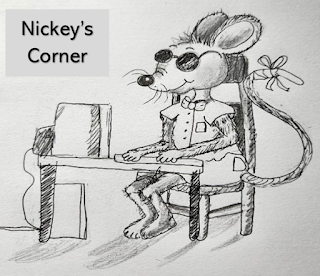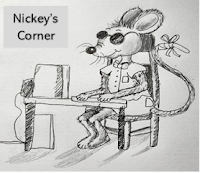It’s good news week
Someone’s dropped a bomb somewhere
Contaminating atmosphere
And blackening the sky
It’s good news week
Someone’s found a way to give
The rotting dead a will to live
Go on and never die.
Have you heard the news?
What did it say?
Who’s won that race?
What’s the weather like today?
It’s good news week…
(Songwriter: Jonathan King © Jonjo Music Co Ltd, sung by: Hedgehoppers
Anonymous 1965)
Buck, you guys, might say, “man”, but I’m a mouse, and so I claim the sobriquet of the male dominant nominative ejaculation of mice. So, I say, Buck, I had a heck of a time finding this first song on the internet. All my life, I had thought the name of the group was Head Choppers Anonymous. Now I discover it is Hedgehoppers Anonymous.
Somehow the good news sounded better to me when it was Head Choppers, but then, that might have more to say about my twisted sense of humor. What’s a hedge hopper anyways?
Each year the Church begins the Advent season with an apocalyptic reading telling us that the world is about to end. There will be various cataclysmic events after which the world will self-destruct: “Heaven and earth will all pass away, but [Jesus’] words will not pass away.”
The question of the day is: What are Jesus’ words that will not pass away?
Amid the sun being darkened, and the moon not giving off its light, when the stars are falling from the skies, when the powers and the heaven are being shaken, when the son of man comes in glory with his angels, what are the words that will not pass away? Are they words of judgment? Are they words of love? Are they words of death and dying or of life?
Look to the fig tree. Find its tender branches and budding leaves leading to a growing season. Nature telegraphs the future much like holding onto the elbow of someone leading a blind person anticipates the direction the leader is turning (or so I’ve been told). Personally, I find tails to be quite reliable.
The lesson of the fig tree teaches us to be observant. Take note of the world. Engage in the world. Participating in those pregnant moments that portend the places of lifegiving constancy is possible even when polluting sacrilege seduces the world to cry out in despair. “Good news week” will not be satirical.
Especially in these days of climate change, the Ukrainian fight for its national individuation, the expulsion of the Armenian Christians from their homeland in Nagnoro-Karabakh, Israel and the devastations witnessed there and in Gaza, and the little mentioned war in Sudan, these apocalyptic words in Mark 13:24-37 loom large. Is this the beginning of the birth pangs of doom? Is the world about to end?
When we witness the migration to the borders of our country of large numbers of people who seek a better life away from oppressive social conditions where they live and who then face inadequate means to welcome them and to provide a place for them, or even the willingness to recognize them as human beings out of fear of losing national white privilege, is this a sign of the end of all things?
When the wealthiest percentage of the world gets immeasurably wealthier and the poor find ever deepening poverty, as the middle class shrinks in the disparity between the wealthiest and the poorest…When political partisanship polarizes social intercourse to the extent that polite conversation is no longer possible…When families no longer associate with one another because of political allegiances…Is that the death knell of social order and American democracy?
When the number of countries who are able to create atomic weaponry continues to grow and the push of a button could initiate a nuclear holocaust…When religious intolerance and other mechanisms create clearer boundaries between us and them and further dehumanize them…Is that the line of demarcation that marks the end of the world?
How much devastation is necessary for us to witness before pundits can pronounce with certainty the long-anticipated demise of God’s purpose for the world?
What are the words of Jesus that will not pass away?
For the words we long to hear, we must first look further in the book of Mark. The time of the sun darkening and the moon not giving off light, when the stars are falling from the heavens, these are known in the time of the crucifixion. These words of paralyzing, cosmological, multiverse collapse do not portend a prophetic Pompeii-esque Pele pyre of permanent purge and world disappearing, but the on covering, revealing hope of something new. These events point to the words of next week, “The beginning of the good news of Jesus Christ, the son of God.”
In modern parlance, apocalypse speaks of world-ending destruction, but, in biblical parlance, apocalypse is the uncovering, the unveiling, the revelation of God’s work in the world. This is why the last book of the Bible is Revelation, not Revelations. Each revelation reveals God’s continued involvement in history and God’s work of saving God’s people through a process of reconciled relationship. The apocalypse of John, or the unveiling of God’s purpose for the world that John reports, ends with a new Jerusalem with the tree whose leaves are for the healing of the nations.
Jesus’ words for us are “Do not be afraid.” Amid the horrifying works of the world Jesus comes and says, “Peace be with you.” Amid the greed of the world and the need to hold onto stuff, Jesus says, “after living up to the commandments, sell all that you have and give it to the poor.” Let go of the stuff; trust in the Love of God.
Know, really know, that that the power of death that engenders fear and trepidation, war and the rumors of war, hate and discrimination, isolation and dehumanization of others, and the fear of the changing unknown, that Christ has destroyed death and walks with you whether or not you know his presence, like the constancy of the life cycle of the fig tree, the constancy that promises new life. Whether you observe the changes of the fig tree, the fig tree continues to do what it does.
It is said that Martin Luther, when asked what he would do if he learned that the world were going to end tomorrow, said that he would plant a tree. Maybe he meant a fig tree. Maybe he meant the Revelation tree of healing. Maybe he referenced the tree from which we all receive life—the cross.
We may not know the day nor the hour when the Son of Man will return, but the fig tree teaches us the constancy of living that continues to produce the sweet fruit of sustenance and delight. Yes, learn the lesson of the fig tree, and know, when the events of fear and destruction surround you, “[Jesus] is near [you], at the very gates [of your borders, your communities, your yards, your homes, your hearts]. In a world where bombs are dropping everywhere, contaminating atmosphere and blackening the skies, where the rotting dead continue to determine the will of nations for revenge, Jesus is the one who teaches us to “live in love and Christ loved us, a fragrant offering and sacrifice to God” (Ephesians 5).
It’s good news week. The catastrophes of the world may continue to surround and frighten, but Jesus has conquered death so that we no longer need to fear death. “Do not be afraid.” Live! Christ is with you!
Your pal,
Nicodemus
Editor,
Theologian, Counsellor, Mouse



